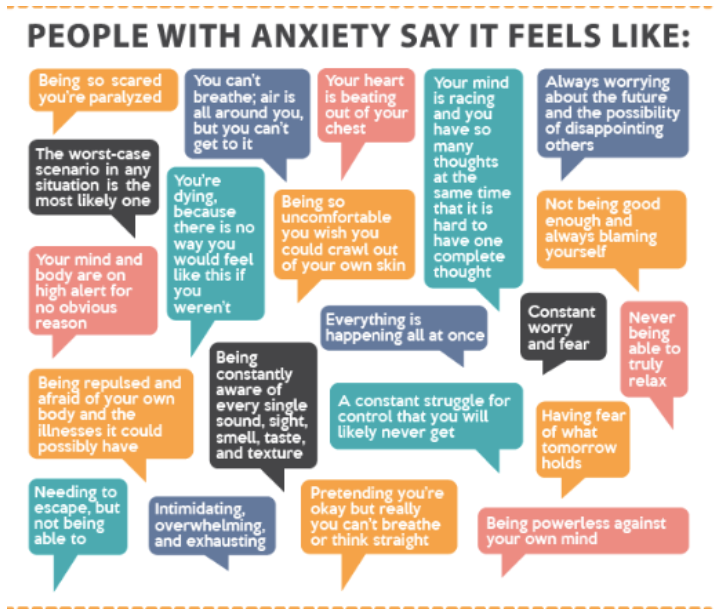What is Anxiety?

His palms are sweaty, knees weak, arms are heavy
There's vomit on his sweater already, mom's spaghetti
He's nervous, but on the surface he looks calm and ready
To drop bombs, but he keeps on forgettin'
What he wrote down, the whole crowd goes so loud
He opens his mouth, but the words won't come out
He's chokin', how, everybody's jokin' now
The clocks run out, times up, over, blaow!
'Lose yourself' by Eminem is one of his most famous songs, but it does well to illustrate how anxiety can affect the mind and body. We all get anxiety to some extent as it is part of our fight or flight response. In stressful situations, a part of our brain alerts us to a potential threat of danger and gets our body ready for action. For many people, it can make us feel more alert, improve concentration and doesn't last long. However, for some, it can be more like Eminem describes it above.
It's diagnosed when symptoms are persistent and hinders the completion of normal daily activities. Some of them are:
- Feeling hot, sweaty more than normal
- Shaky or weak
- Nauseous, dizzy, like the room is spinning
- Brain fog, lack in concentration, memory loss
- Feeling stuck to the spot or trapped
At times, symptoms build up gradually then become overwhelming, or they can come all at once like a big wave. This 'wave' is known as a panic attack. In both cases, it can feel really scary, isolating and painful. It can be hard to breathe and see the end of the attack. There is an end to the wave; our bodies cannot maintain a high anxiety state for long.
Church can be a minefield for anyone with anxiety. Think about your typical service - there's usually time at the beginning where people gather together, some songs are sung, maybe some readings from the Bible, a talk and then time at the end before everyone leaves. Before and after the service can be busy times, especially at my church; we can have a few hundred people milling around. It can be hard to know who to talk to or when to sit down if you don't know the church well. Particularly in my church, it can be easy to get in and out without really being stopped by anyone or having a conversation.
Even in small groups, there can be moments that induce anxiety. Being too early or late, contributing to conversation, meeting new people can be nerve-wracking. There can be lots of thoughts going round a person's mind...

For everyone, it's good to learn what helps your body relax and manage any symptoms. It could be listening to music, going for a walk, making something with your hands or talking to someone. One thing may work one day, but not the next, so it's useful to have a bank of strategies that can help. Part of this is getting to know your body and lifestyle. Do you need to be getting more sleep? Are there foods that make you feel worse? Do you have phases of life that are busier than others? It may take time to learn what works for you, but there is lots of support out there.
If you see anyone in a state of panic, ask and listen to what they want. Do they need help managing their breathing or moving away from a situation? Affirm and reassure them that they are not on their own, what they are feeling may feel scary now but will end. See if they can move with you e.g. walking around to help release some of the nervous energy. Signpost them to their GP, other forms of support. If someone is having a full panic attack, it can be physically damaging and may need medical attention more urgently.
Whether you are someone with anxiety, or you support someone with anxiety, remember you are never alone. There is so much support out there, so make sure you know where to go when you need it.


